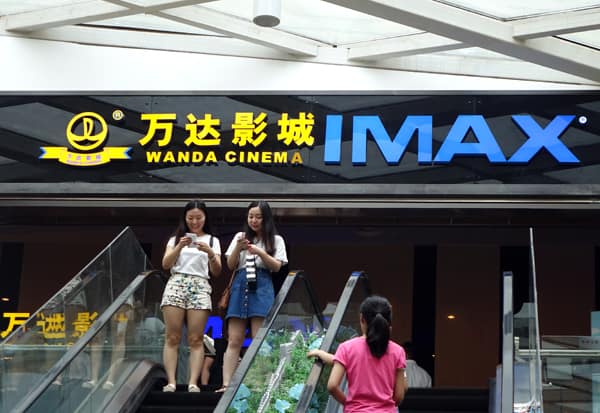
Jack Ma (right) and Wan Jianlin will be making movies together
Alibaba Group has closed on its acquisition of a RMB 4.68 billion ($744 million) stake in Wanda Film to become the film company’s second largest shareholder, following through on an agreement signed in early February. The move came just days after Jack Ma’s e-commerce giant signed an agreement to expand its Hema smart supermarket chain with some of China’s top property developers, as Alibaba expands its offline footprint.
Alibaba purchased 90 million shares in Wang Jianlin’s entertainment company for RMB 51.98 per share, which represents a 7.66 percent stake in Wanda Film, a filing to the Shenzhen Stock Exchange shows.
The investment paves the way for China’s biggest online marketplace to cooperate with its largest theatre chain on movie distribution and investment, online ticketing, marketing and movie merchandising, Wanda Film said in the filing.
Alibaba Grabs Share in China’s Biggest Theatre Chain
The deal gives Alibaba a stake in Wang Jianlin’s cinema company, which controls about 14 percent of China’s cinema market. Wanda Film Holding, formerly known as Wanda Cinema Line, is also the world’s largest movie group by revenue. It operates some 500 cinemas and 4,000 screens across China, and also engages in film production, distribution and marketing. The movie company had operating revenues of RMB 13.2 billion ($2 billion) last year.
The e-commerce behemoth’s own film company, Alibaba Pictures, is already involved in content production, Internet advertising and distribution for movies, and ticketing management for theatre chains. Alibaba’s entertainment arm Alibaba Culture and Entertainment Group also owns video site Youku, concert ticketing platform Damai.cn and Alibaba Music — a music streaming service.
On top of the RMB 4.68 billion investment from Alibaba, Wanda Film secured another RMB 3.12 billion ($496 million) investment from state-backed Cultural Investment Holdings Ltd (CIH) at the same time.
From Cinemas to Offline Retail

One of Wanda’s over 500 movie theaters across mainland China
Jack Ma’s e-commerce conglomerate has been expanding aggressively in the offline world over the last two years, with the pace of that expansion quickening in 2018. Just last week, Alibaba signed an agreement with five of China’s top ten developers including China Vanke, Evergrande and Country Garden to bolster its supermarket chain HEMA. Under the agreement, the builders will help secure new locations for Hema stores.
In addition to its grocery growth plan, Alibaba invested approximately RMB 5.45 billion ($866 million) for a 15 percent stake in a Chinese furniture chain operator Easyhome (居然之家) in February. In the online to offline tie-up Alibaba indicated that it would leverage its cloud computing technology and online membership of 488 million active users to support the digitalisation of Easyhome’s 223 stores in China.
Competition With JD.com Heats Up
Meanwhile, Alibaba’s largest e-commerce rival JD.com is also expanding its brick and mortar business. China’s second-largest e-commerce network opened its first 7Fresh grocery store in Beijing at the beginning of this year, which is seen as a competition with the Hema chain. JD followed up on that deal with a partnership with convenience store chain FamilyMart, which allows users of the e-commerce platform to have food delivered to their doors from any of FamilyMart’s core locations in Beijing, Shanghai, Shenzhen and Chengdu.
Last month JD also made a move to get involved in fashion retail by picking up a cornerstone stake in the S$396.0 million ($301.7 million) IPO of Sasseur REIT in Singapore, giving the online shopping platform a piece of China’s outlet mall universe.
Leave a Reply